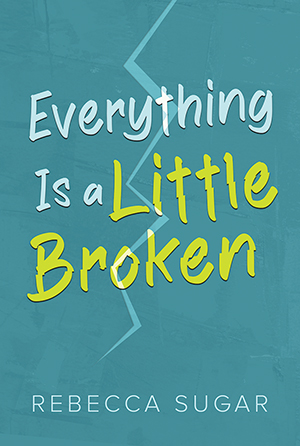Reviewed by NEAL GENDLER
At the moment, life for Rebecca Sugar’s main character Mira isn’t so sweet.
Her father, Matt Frank, has endured decades of pain and mobility problems. Now 79, he’s temporarily almost unable to move his arms and hands after spinal surgery.
 Once-close brother Daniel has become emotionally as distant as his Los Angeles separating him from their New York. She and her mother Dana communicate poorly. And Mae Boyd, treasured nanny for Matt, then Mira and Daniel, is 94, slipping toward meeting the Lord she praises for everything.
Once-close brother Daniel has become emotionally as distant as his Los Angeles separating him from their New York. She and her mother Dana communicate poorly. And Mae Boyd, treasured nanny for Matt, then Mira and Daniel, is 94, slipping toward meeting the Lord she praises for everything.
Mira’s husband Aaron wants to move to Florida where his company is opening a new operation.
Mira copes, exchanging snappy wit with Matt, who specializes in it.
Every two weeks, she visits Mae in her tiny Brooklyn walk-up. Matt no longer can handle stairs, and Mae, with whom he talks daily, is “one of the most important people in his world, … the one person left on earth who knew his whole history.” He pays Mae’s rent, expenses, house cleaner and day nurse. Aaron suggests connecting Mae and Matt through Mira’s laptop.
Mira “beamed with delight” as Matt and Mae saw each other, soon entering “a comfortable and familiar conversation that spanned family, old memories, the Bible, and life.” Mae asks Matt about his health.
“She prayed over him, and Mira could see how deeply she meant every word. She thought that if God were in the business of answering prayers, He wouldn’t have the heart to deny Mae hers.”
Everything is a Little Broken is an engaging, insightful picture of what many have faced or will: an aging parent acknowledging and rebelling against physical infirmity, and Mae quietly accepting her approaching end.
Sugar, a New York Sun columnist, needs few pages to convey life’s realities superbly through believable characters and understatement.
Yet charming Everything has wit. At Shabbat dinner, Matt and frequent guest Dr. Baron tease each other about age and girls of their youth.
“One of the few benefits of old age is the license you get to tell your life story however you like,” Baron says. “There aren’t enough people alive to contradict what you say!”
Soon, Baron says: “No more old. Only young. Aaron, how is work?”
“Am I now the definition of young?” Aaron asks. “I am fifty-two!”
Baron says: “Young is still having a barber.”
The title is a remark by the cabby driving Mira to Matt’s hospital.
In its lobby, “she recognized the slow shuffle of pale patients, fortunate enough to be on their feet, walking through the exhaustion and pain of each step. Escorting them were family members and friends, bearing another kind of pain written all over their faces.”
Her father is in bed, defiantly wearing a blue business shirt over his hospital gown.
“Nice shirt!” she says. “Hospital-issue?”
“You should see what they tried to get me to wear,” Matt replies. He won that round, but he cannot defeat the weakening that began at 44, when a corrective spinal-cord surgery prevented paralysis.
“In every way that his body failed him, his expansive mind and courageous spirit compensated,” Sugar writes. “His intellect was as strong as any of his attenuated muscles might have been, and his sense of humor never was dulled by his suffering.” He refused painkillers, “unwilling to compromise his ability to run his business or to be fully present for his family.”
Mira feels a chill, looking at her father “with his limp arms and useless hands. … His worst nightmare was to be helpless, and it was hers as well.”
Returned home, Matt sits in his “blue fabric recliner with wooden block arms and legs.” It was his father’s, “worn and tired-looking from decades of use.” He won’t allow Dana to change it. “It had history, and scars, like he did.”
Housekeeper-caregiver Gloria looks at Matt, seeming “unable to resist the impulse to tend to him.” Kneeling to tie his shoelace, she says, “Why are men so careless?” kindly putting him “in the category of hopeless men who can’t take care of themselves, rather than the smaller category of those who are re-learning how to use their fingers.”
Matt says: “I love it when women genuflect in front of me. It makes me feel like the king I never was.”
Mira’s daughter Lilly surprises Mira by coming home from college for Thanksgiving. She suggests going to synagogue Saturday. Seeing her parents’ surprise, she adds: “I’ve been going to services on campus and I kind of like it. … You don’t have to — I just thought …”
“Have to?” Mira replies. “Aaron, do you think a parent could wish for anything more than her teenage daughter to ask her if it is okay if they go to synagogue together?” Squinting at Lilly, she says: “Don’t you know you are supposed to come home from school and tell your parents that you are now a Wiccan and a Communist who resents everything about the narrow way you were raised?”
Shul doesn’t inspire Mira, but Lilly does, whispering the words of the Amida, “far more poised, beautiful, and self-possessed than she ever could have hoped to be at her age.” Aaron squeezes Mira’s hand, and she senses “that life in that moment was as good and whole as it would ever be.”
***
Neal Gendler is a Minneapolis writer and editor.
(American Jewish World, May 2024)




















